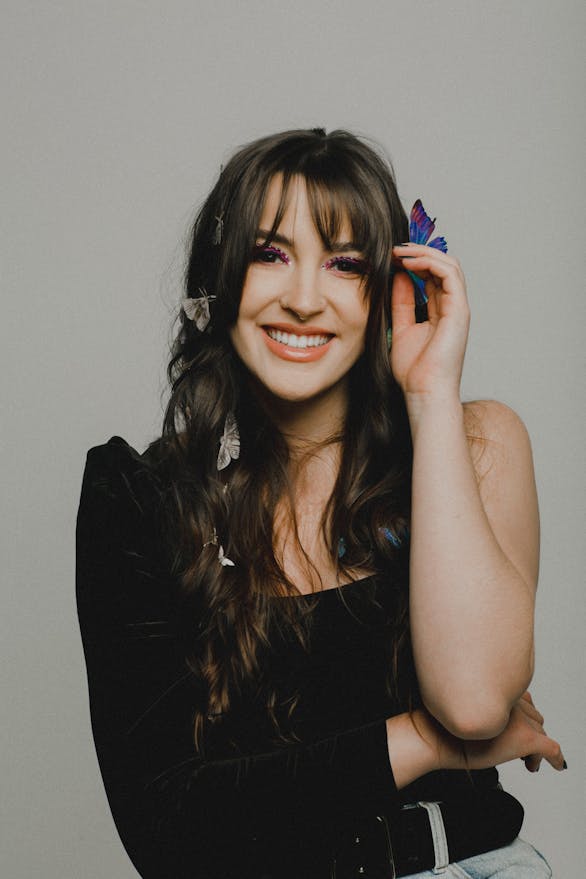After a hiatus from recording due to the COVID-19 pandemic and career changes, singer-songwriter Mackenzie Morrow couldn't get back into the recording studio. Instead of giving up, the USC alumna adapted to the challenge and found herself turning her emotions and experiences into her latest album, "Black Butterfly."
The album, two years in the making, spanned years of hard work and carries the echoes of Morrow's highest highs and lowest lows.
With this album, Morrow said she hopes to shed light on mental health struggles, to normalize not being okay and to encourage listeners to accept love and light back into their lives.
“The album came about because I had pushed artist Mackenzie back into this dark corner" Morrow said. "I was just ready to get back in the studio, I was bursting at the seams, I was just like, screw this, I gotta record. And I was like, I need to be consistent with that. And I didn't care what it took."
The album presents themes surrounding emotionally abusive relationships as well as dealing with anxiety. Morrow sheds a light on the challenges of presenting oneself to the world and hopes this album serves as a conduit to spark a bigger conversation about mental health.
“I've got a bubbly personality. And I know that for a lot of people that would never guess I had anxiety or that I've had some of the thoughts I've had or that I'm struggling." Morrow said. "There are plenty of people that seem okay, that are not, and it's just important to check on people even if you think they're the happiest person in the world.”

A photo portrait of USC alumna Mackenzie Morrow for her newly released album "Black Butterfly." Her album explores a variety of topics, such as emotionally abusive relationships, anxiety and other parts of life.
Morrow said she finds support in her community, whether it be from her church or from her recording studio, Archer Avenue Studios.
Morrow is native to upstate South Carolina but has been recording at Archer Avenue Studios in downtown Columbia for several years. Morrow has been largely guided through the musical process by her producer, Kenny McWilliams, the owner of Archer Avenue Studios.
“When we started this second record, she (Morrow) definitely had way more of a vision of what she wanted to sound like. She brought me much better songs and had learned a lot about song structure and chord arranging and tempos and things like that," McWilliams said. "Then really what Mackenzie is so gifted at is lyrics and melody, and she's always been there that she just kind of took it to another level on this record.”
Her lyricism is seen is songs such as “Self” which delves into an emotionally abusive relationship Morrow was in. While the song was inspired by her previous relationship, the main premise of the song surrounds the idea of personal growth.
Throughout her music video for the song "Self", Morrow faces and sings to herself in a mirror. The video ends with her leaving the mirror behind, to symbolize leaving behind the other version of herself.
“The self in the mirror was being left behind by the other version of me," Morrow said. "And instead of clinging so hard on to who you used to be or whatever, you can move forward and grow and just continue to become a better version of yourself because we've all got things about us that we don't like."
The music video for "Self" was directed and produced by Trey Morrow, Mackenzie Morrow’s brother. Trey Morrow said he worked hard to make sure the video remained true to Mackenzie Morrow's vision and wanted to emphasize her message of mental health in a visual way.
“She's (Mackenzie) a really strong advocate for mental health awareness, and things like that. She's got throughout her album a whole lot of stories about things that have happened in her life surrounding that type of stuff," Trey Morrow said. "With a music video, I kind of wanted to echo her message in my own way."
Mackenzie Morrow closes the album with title track, "Black Butterfly," which is about self acceptance, and embracing who you truly are. Mackenzie Morrow wrote the song looking back on her life and moments where she felt like she didn’t quite fit in.
“It's the idea of being like a black sheep, being an outcast, but it (the song) even says like, ‘you tried to paint your wings, but it didn't work. If only you could see just what you're worth,'" Mackenzie Morrow said. "Like, there's no point in trying to camouflage yourself into whoever's around you."
The album is now available on all music streaming platforms.

